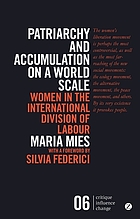To mark International Women’s Day 2024, we asked SuPWR colleagues to send us their essential feminist reads.
Ranging from meditations and essay collections to academic books and working papers, these essential reads cover an array of issues including care, labour, constructions of Muslim women, lessons from other species, grassroots feminism, the objectification of women in patriarchal societies and mansplaining.
We recognise and celebrate the intersectional movements and the multiple connotations of feminism, and therefore present this list not as prescriptive of what must constitute feminism and feminist reads, but an ever-growing collection and conversation.
Don’t see your favourite feminist read in this list? Share it with us! Post it on X (formerly known as Twitter) with the hashtag #FeministReads and tag @su_pwr.
Essential reads
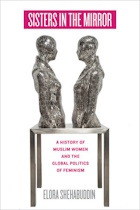 Sisters in the Mirror: A History of Muslim Women and the Global Politics of Feminism
Sisters in the Mirror: A History of Muslim Women and the Global Politics of Feminism
By Elora Shahabuddin
Shamsad Navia Novelly, SuPWR Researcher and Research Associate at BRAC Institute of Governance and Development (BIGD) Bangladesh, says:
“Sisters in the mirror is not the first book in the literary realm that deconstructs the idea of Muslim women as oppressed individuals in need of rescuing, a picture regularly painted by the Western media as well as politicians. Yet, it is a significant creation worth reading for every feminist because Dr. Elora Shehabuddin makes substantial use of historical resources she received from her long standing feminist network in Bangladesh. The author not only explores the emergence of Bengali Muslim women throughout generations but also correlates important global feminist movements with simultaneous occurrences in the Bangladeshi subcontinent explaining the subtle gender politics hidden in every layer of the historical events.”
Patriarchy and Accumulation on a World Scale: Women in the International Division of Labour
By Maria Mies
Mubashira Zaidi, SuPWR Co-Investigator & Country Lead (India) and Research Fellow at the Institute of Social Studies Trust, says:
“Maria Mies’s “Patriarchy and Accumulation on a World Scale” stands as an essential feminist read, dissecting the intertwined roots of capitalism and patriarchy in shaping the sexual division of labour locally and globally. The book compellingly illuminates how the global hierarchy, rooted in the exploitation of women, nature, and colonized communities, persists. Mies underscores the intricate interplay between sexual, social, and international divisions of labour, portraying women as both life producers and victims of cyclical exploitation. The text delves into the paradox of women’s simultaneous roles as crucial contributors and marginalized entities, ranging from the housewifization of the affluent to the alienation of those in colonized settings. And very importantly, it reinforces the vital link between feminist theorization and activist practice in dismantling oppressive structures.”
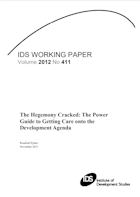 The hegemony cracked: the power guide to getting care onto the development agenda
The hegemony cracked: the power guide to getting care onto the development agenda
By Rosalind Eyben
Deepta Chopra, SuPWR Principal Investigator and Professorial Research Fellow at IDS, says:
“Prof Eyben very skilfully and appropriately deploys the concept of power to understand why, despite growing evidence, it has been so hard to get unpaid care issues onto the agendas of policy makers and development practitioners. If you are interested in knowing about and practicing strategies of visibilising care (or indeed other hidden feminist issues) in policy and practice, this is an essential read. Speaking from the vantage point of having applied the strategies of naming, framing and claiming in policy and practitioner spaces, I can tell you that these work! In addition, Prof Eyben’s analysis has given me valuable directions to advance research agendas on womxn’s organising to counter the power issues behind invisibility of the issues that matter most to them (including care work).”
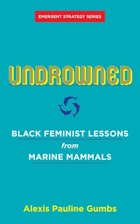 Undrowned: Black feminist lessons from marine mammals
Undrowned: Black feminist lessons from marine mammals
By Alexis Pauline Gumbs
Aimen Bucha, SuPWR Researcher and Lead Researcher at the Institute of Development and Economic Alternatives (IDEAS) Pakistan, says:
“Undrowned is a book-length meditation that is a mix of ‘poetic sensibility and naturalist observation’ navigating a context marked by ‘racial gendered ableist capitalism’. This book is an offering for anyone looking to find lessons in grounding and expansiveness in today’s time. With its masterful use of metaphor, the book helps us find space to (re)define living by looking at intergenerational practices across species. Our interdependence across species is what sits at the heart of this fantastic book.”
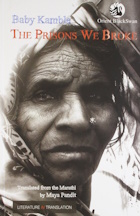 The Prisons We Broke
The Prisons We Broke
By Babytai Kamble
Priya Raghavan, SuPWR Researcher and Research Fellow as IDS, says:
“Babytai Kamble’s autobiographical account of life in a Mahar community, first published in Marathi as Jina Amucha before being translated to English by Maya Pandit, is a searing account of the subjugation and redemption of Dalit women under the simultaneous conditions of Brahminical Hindu hegemony and patriarchy. Striking in both form and content, Kamble’s writing is a masterful exercise in collective testimony, where Kamble finds her own voice, experience and narrative fundamentally inseparable from the community of women amongst whom she lives, struggles, and resists – “The suffering of my people became my own suffering. Their experiences became mine. I find it difficult to think of myself outside of my community” (136).”
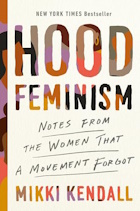 Hood Feminism: Notes from the Women That a Movement Forgot
Hood Feminism: Notes from the Women That a Movement Forgot
By Mikki Kendall
Sujeena Shakya, SuPWR Researcher and Knowledge Management Specialist at CARE Nepal, says:
“Hood Feminism provides a comprehensive and critical overview on the failures and limitations of the mainstream feminist movement, which mostly promotes the agendas of elite feminists and has sadly failed to incorporate the voices and concerns of the real grassroots communities. The author argues that the mainstream feminist movement rarely talks about meeting basic needs as a feminist issue, whereas food insecurity, access to quality education, safe neighbourhoods, a living wage, and medical care are all feminist issues. Based on an intersectional approach, this book is a must read for those who want to understand about feminism that is driven by the marginalized and grass roots communities.”
 Selected Columns
Selected Columns
By Taslima Nasreen
Iffat Jahan Antara, SuPWR Researcher and Research Associate at at BRAC Institute of Governance and Development (BIGD) Bangladesh, says:
“Published in 1992, this essay collection illustrates the pervasive objectification of women in patriarchal societies and criticizes how religious doctrines exacerbate this oppression and restrict women’s autonomy. This was a groundbreaking work in the context of Bangladesh which provoked discussion around religion as a tool of power and domination and how it controls women’s sexuality. The author challenges the prevailing notions of liberal feminism in Bangladesh since its liberation and highlights the everyday instances of women’s sexual exploitation through her personal experiences.”
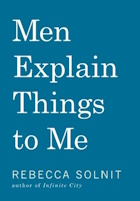 Men Explain Things to Me
Men Explain Things to Me
By Rebecca Solnit
Iffat Jahan Antara, SuPWR Researcher and Research Associate at BRAC Institute of Governance and Development (BIGD) Bangladesh, says:
“This is also a collection of essays on women’s rights issues. The title essay documents the phenomenon of “mansplaining” that we use commonly now. But the essays are not just about it. There are discussions on violence against women, equal marriage, and knowledge and authority. I think the brilliance of this book is that the author in a simple, witty way connects the issues and shows that these are not separable but rather understands the abuse of power as a whole. I would suggest this book to beginners of feminist readings. And it is fun to read it!”
